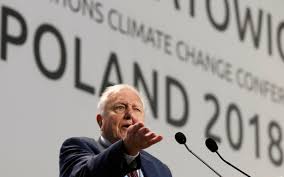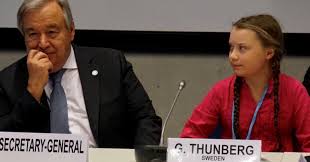Institutional and Cultural Inertia
EDITORIAL, 17 Dec 2018
#565 | John Scales Avery – TRANSCEND Media Service
Why do we not respond to the crises?
Today we are faced with multiple interrelated crises, for example the threat of catastrophic climate change or equally catastrophic thermonuclear war, and the threat of widespread famine. These threats to human existence and to the biosphere demand a prompt and rational response; but because of institutional and cultural inertia, we are failing to take the steps that are necessary to avoid disaster.
Only Immediate Climate Action Can Save the Future
Immediate action to halt the extraction of fossil fuels and greatly reduce the emission of CO2 and other greenhouse gasses is needed to save the long-term future of human civilization and the biosphere.
At the opening ceremony of United Nations-sponsored climate talks in Katowice, Poland, Sir David Attenborough said “Right now, we are facing a man-made disaster of global scale. Our greatest threat in thousands of years. Climate change. If we don’t take action, the collapse of our civilizations and the extinction of much of the natural world is on the horizon. The world’s people have spoken. Their message is clear. Time is running out. They want you, the decision-makers, to act now.”
Antonio Guterres, UN Secretary-General, said climate change was already “a matter of life and death” for many countries. He added that the world is “nowhere near where it needs to be” on the transition to a low-carbon economy.

Figure 1: Speaking at the opening ceremony of COP24, the universally loved and respected naturalist Sir David Attenborough said: If we don’t take action, the collapse of our civilizations and the extinction of much of the natural world is on the horizon.”
Swedish student Greta Thunberg, is a 15-year-old who has launched a climate protest movement in her country. She said to the UN leader Antonio Guterres at the UN conference in Katowice: “Some people say that I should be in school instead. Some people say that I should study to become a climate scientist so that I can ‘solve the climate crisis.’ But the climate crisis has already been solved. We already have all the facts and solutions.”
She added: “Why should I be studying for a future that soon may be no more, when no one is doing anything to save that future? And what is the point of learning facts when the most important facts clearly mean nothing to our society?”
Thunberg continued: “Today we use 100 million barrels of oil every single day. There are no politics to change that. There are no rules to keep that oil in the ground. So we can’t save the world by playing by the rules. Because the rules have to be changed.”
She concluded by saying that “since our leaders are behaving like children, we will have to take the responsibility they should have taken long ago.”
Institutional Inertia
Our collective failure to respond adequately to the current crisis is very largely due to institutional inertia. Our financial system is deeply embedded and resistant to change. Our entire industrial infrastructure is based on fossil fuels; but if the future is to be saved, the use of fossil fuels must stop.
International relations are still based on the concept of absolutely sovereign nation states, even though this concept has become a dangerous anachronism in an era of instantaneous global communication and economic interdependence. Within nations, systems of law and education change very slowly, although present dangers demand rapid revolutions in outlook and lifestyle.
The failure of the recent climate conferences to produce strong final documents can be attributed to the fact that the nations attending the conferences felt themselves to be in competition with each other, when in fact they ought to have cooperated in response to a common danger. The heavy hand of the fossil fuel industry also made itself felt at the conferences.

Figure 2: UN Secretary-General Antonio Guterres, and 15-year-old Swedish climate activist Grethe Thunberg addressing the opening ceremony of COP24.
Until the development of coal-driven steam engines in the 19th century, humans lived more or less in harmony with their environment. Then, fossil fuels, representing many millions of years of stored sunlight, were extracted and burned in two centuries, driving a frenzy of growth of population and industry that has lasted until the present. But today, the party is over. Coal, oil and gas are nearly exhausted, and what remains of them must be left in the ground to avoid existential threats to humans and the biosphere.
Big coal and oil corporations base the value of their stocks on ownership of the remaining resources that are still buried, and they can be counted on to use every trick, fair or unfair, turn those resources into money.
In general corporations represent a strong force resisting change. By law, the directors of corporations are obliged to put the profits of stockholders above every other consideration. No room whatever is left for an ecological or social conscience. Increasingly, corporations have taken control of our mass media and our political system. They intervene in such a way as to make themselves richer, and thus to increase their control of the system.
Polite Conversation and Cultural Inertia
Each day, the conventions of polite conversation contribute to our sense that everything is as it always was. Politeness requires that we do not talk about issues that might be contrary to another person’s beliefs. Thus polite conversation is dominated by trivia, entertainment, sports, the weather, gossip, food, and so on. Worries about the distant future , the danger of nuclear war, the danger of uncontrollable climate change, or the danger of widespread famine seldom appear in conversations at the dinner table, over coffee or at the pub. In conversations between polite people, the situation is exactly the same as in the mass media. We obtain the false impression that all is well with the world. But in fact, all is not well. We have to act promptly and adequately to save the future.
Shooting Santa Claus
No one wants to shoot Santa Claus. That goes without saying! Who would want to harm that jolly old man, with his reindeer and sleigh, and his workshop at the North Pole? Who would want to prevent him from bringing happiness to everyone? Who would want to stop him from making the children’s eyes light up like stars? Surely no one!
But the sad truth today is that we have to get rid of Santa somehow, before he kills us, and before he kills most of the plants and animals with which we share our world. Perhaps shooting is too harsh. Perhaps we should just forget Santa and all that he stands for, with his red suit, invented by the advertising department of Coca-Cola.
This is what Santa stands for: The customer is always right. Your wish is our command. You have a right to whatever you desire. If you feel like taking a vacation on the other side of the world, don’t hesitate, just do it. If you feel like buying a SUV, just do it. Self-fulfillment is your birthright. Spending makes the economy grow, and growth is good. Isn’t that right?
But sadly that isn’t right. We have to face the fact that endless economic growth on a finite planet is a logical impossibility, and that we have reached or passed the the sustainable limits to growth.
In today’s world, we are pressing against the absolute limits of the earth’s carrying capacity, and further growth carries with it the danger of future collapse. In the long run neither the growth of industry nor that of population is sustainable; we have now reached or exceeded the sustainable limits.
The size of the human economy is, of course, the product of two factors: the total number of humans, and the consumption per capita. Let us first consider the problem of reducing the per-capita consumption in the industrialized countries. The whole structure of western society seems designed to push its citizens in the opposite direction, towards ever-increasing levels of consumption. The mass media hold before us continually the ideal of a personal utopia, filled with material goods.
Every young man in a modern industrial society feels that he is a failure unless he fights his way to the “top”; and in recent years, women too have been drawn into the competition. Of course, not everyone can reach the top; there would not be room for everyone; but society urges us all to try, and we feel a sense of failure if we do not reach the goal. Thus, modern life has become a competition of all against all for power and possessions.
When possessions are used for the purpose of social competition, demand has no natural upper limit; it is then limited only by the size of the human ego, which, as we know, is boundless. This would be all to the good if unlimited industrial growth were desirable; but today, when further industrial growth implies future collapse, western society urgently needs to find new values to replace our worship of power, our restless chase after excitement, and our admiration of excessive consumption.
If you turn on your television set, the vast majority of the programs that you will be offered give no hint at all of the true state of the world or of the dangers which we will face in the future. Part of the reason for this willful blindness is that no one wants to damage consumer confidence. No one wants to bring on a recession. No one wants to shoot Santa Claus.
But sooner or later a severe recession will come, despite our unwillingness to recognize this fact. Perhaps we should prepare for it by reordering the world’s economy and infrastructure to achieve long-term sustainability, i.e. steady-state economics, population stabilization, and renewable energy.
Our Responsibility to Future Generations and to the Biosphere
All of the technology needed for the replacement of fossil fuels by renewable energy is already in place. Although renewable sources currently supply only 19 percent of the world’s energy requirements, they are growing rapidly. For example, wind energy is growing at the rate of 30 percent per year. Because of the remarkable properties of exponential growth, this will mean that wind will soon become a major supplier of the world’s energy requirements, despite bitter opposition from the fossil fuel industry.
Both wind and solar energy have can now compete economically with fossil fuels, and this situation will become even more pronounced if more countries put a tax on carbon emissions, as Finland, the Netherlands, Norway, Costa Rica, the United Kingdom and Ireland already have done.
Much research and thought have also been devoted to the concept of a steady-state economy. The only thing that is lacking is political will. It is up to the people of the world to make their collective will felt.
History has given to our generation an enormous responsibility towards future generations. We must achieve a new kind of economy, a steady-state economy. We must stabilize global population. We must replace fossil fuels by renewable energy. We must abolish nuclear weapons. We must end the institution of war. We must reclaim democracy in our own countries when it has been lost. We must replace nationalism by a just system of international law. We must prevent degradation of the earth’s environment. We must act with dedication and fearlessness to save the future of the earth for human civilization and for the plants and animals with which we share the gift of life.
__________________________________________
 John Scales Avery, Ph.D., who was part of a group that shared the 1995 Nobel Peace Prize for their work in organizing the Pugwash Conferences on Science and World Affairs, is a member of the TRANSCEND Network and Associate Professor Emeritus at the H.C. Ørsted Institute, University of Copenhagen, Denmark. He is chairman of both the Danish National Pugwash Group and the Danish Peace Academy and received his training in theoretical physics and theoretical chemistry at M.I.T., the University of Chicago and the University of London. He is the author of numerous books and articles both on scientific topics and on broader social questions. His most recent books are Information Theory and Evolution and Civilization’s Crisis in the 21st Century (pdf).
John Scales Avery, Ph.D., who was part of a group that shared the 1995 Nobel Peace Prize for their work in organizing the Pugwash Conferences on Science and World Affairs, is a member of the TRANSCEND Network and Associate Professor Emeritus at the H.C. Ørsted Institute, University of Copenhagen, Denmark. He is chairman of both the Danish National Pugwash Group and the Danish Peace Academy and received his training in theoretical physics and theoretical chemistry at M.I.T., the University of Chicago and the University of London. He is the author of numerous books and articles both on scientific topics and on broader social questions. His most recent books are Information Theory and Evolution and Civilization’s Crisis in the 21st Century (pdf).
This article originally appeared on Transcend Media Service (TMS) on 17 Dec 2018.
Anticopyright: Editorials and articles originated on TMS may be freely reprinted, disseminated, translated and used as background material, provided an acknowledgement and link to the source, TMS: Institutional and Cultural Inertia, is included. Thank you.
If you enjoyed this article, please donate to TMS to join the growing list of TMS Supporters.

This work is licensed under a CC BY-NC 4.0 License.
[…] (Read the article on Transcend Media Services) […]
Dear John Scales Avery,
Thank you for sharing your thoughts with us. As some who speaks my mind out all the time, particularly on matters political, Human Rights, social injustice, hunger, untlod suffering in the world due to the Arms Trade, etc, etc, I’m delighted to report I do not belong to the passive, indifferent or ignorant groups you describe.
I could not agree more with you when you say “We must achieve a new kind of economy, a steady-state economy.” What do you propose politicians do? at the moment state economies are based on the manufacturing, selling and buying of military paraphernalia, from tiny bullets to titanic warships. Politicians would love to run the show by themselves and keep the millionaire commissions for themselves. However, the immorarlity of so many military deals (buying and selling death) forces politicians and diplomats to rely on the private sector, for privacy and discretion. Alo, this makes it easier for Governments to shamelessly lie to the voters who gave them power, by telling the they’re working for Peace.
You say ” We must stabilize global population”. How do you plan to achive this when the two more powerful and popular Religions, Catholicism and Islam, prohibit contraception? you say “We must abolish nuclear weapons” when it is the 70 years of anti-nuclear campaigns that have allowed scientists to develop conventional weapons, missiles, explosives of such sophistication and lethal power that nuclear weapons have become obsolete.
You write “We must end the institution of war” How can you end the institution of music whilst manufacturing and selling music instruments, teaching how to play them, build music schools, concert halls, make and sell CDs, etc?
You say “We must reclaim democracy in our own countries when it has been lost” When did we have ‘democracy’? I have lived in three countries, Argentina, Switerland and the UK, have visited nearly 60 countries and can safely say “democracy does not exist, democracy is a myth”.
Good that you say “We must replace nationalism”, how? how can we change nationalistic minds when children are forced to learn their National anthem?
How can you prevent the degradation of the earth’s environment in a militarized world? fossil fuel feeds our tanks, air-fighters and warships: even nuclear submarines. I agree with you, we must “save the future of the earth for human civilization and for the plants and animals with which we share the gift of life. ”
STEP ONE: join HUFUD and campaign with us for a demilitarized world: the only step possible if we are to achieve our common aims.
Alberto (President HUFUD)
[…] originale: Institutional and Cultural Inertia Traduzione di Miki Lanza per il Centro Studi Sereno […]